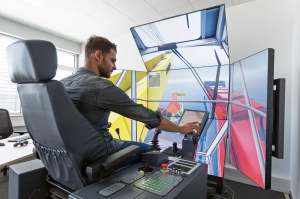


(Posted on 27/03/19)
A new Liebherr simulator is on its way to New Zealand. Port Nelson ordered a classroom solution in order to simulate ship crane and mobile harbour operation. The simulator has even the possibly to add further Liebherr crane modules in the future.
Port Nelson at the top of New Zealand’s South Island will soon have its own training simulator supplied by Liebherr. It is presently on the water on route to the port, with an arrival date for April. The simulator is actually two in one allowing for training on more aspects of real port operations, with both a generic ship crane simulator and the LiSIM version of the LHM 550 mobile harbour crane, both utilising much of the same hardware. The ship crane simulation-software features the CBG series, a floating four-rope grab crane with a boom length of 28 metres and a maximum lifting capacity of up to 45 tonnes. The LHM 550 mobile harbour crane simulator is equipped with its original LiTRONIC crane controls and has training programs installed for basic operations, bulk, breakbulk and container handling, reflecting the port’s present and future operations.
Simulators are globally recognized as a highly effective training method offering numerous advantages. The development of this sophisticated training tool was prompted by Liebherr’s extensive experience in crane operator training. Based on the original Litronic crane control system, LiSIM is the only realistic virtual solution available on the market for learning the precise and innovative control of Liebherr maritime cranes. “The simulator allows benchmarking of current driver skills and monitoring of drivers using periodic checks, plus can be used to assess new drivers for suitability without the costs associated with running a real crane, such as fuel and wear-and-tear. It will make for safer and more efficient handling in a variety of weather conditions,” Jonny Cook, the Port’s Container Operations Manager reported. “We also expect it to reduce box damage during operations,” he added.
“Port Nelson are a long-standing customer with us, and it’s great to see them buying our very first MHC simulator for Oceania,” Liebherr’s Gordon Clark commented. “There’s even the possibility to add further modules if they want to train others, for example offshore customers. It could end up being a stand-alone profit centre.” Port Nelson’s General Manager Operations, Matt McDonald sees the simulator purchase as a “step-up in safety” for the port. “Training new personnel on the quay is expensive, but also dangerous as they learn to handle large lifts, occasionally in windy or adverse conditions. We can also simulate situations that you hope never to see in real life and train people on how to react to them, the same as the aviation industry has done for years.”
Bruks Siwertell Group has announced a leadership transition as Peter Jonsson steps down as CEO after... Read more
ClassNK has issued an approval in principle (AiP) for a Rigid Windsail Type Wind-Assisted Propulsion... Read more
Elcome International’s new high-speed internet service, WELCOME, is revolutionising the way ship... Read more
Kaiko Systems, a leader in AI-driven frontline intelligence for the maritime industry, today announced... Read more
Marcegaglia’s latest acquisition, the LHM 600, marks a significant milestone as the 2,000th mobile... Read more
The Isle of Man Ship Registry (IOMSR) is playing a key role in the development of a high-tech sail aimed... Read more
AtoB@C Shipping, subsidiary of ESL Shipping, has taken delivery of Terramar in Goa, India on 14 March... Read more
As a new strategy period commences, VIKING Life-Saving Equipment A/S has achieved strong financial results... Read more
Baltic Exchange has introduced a series of green fuel options to its FuelEU voyage and compliance cost... Read more
Veson Nautical, a global leader in maritime data and freight management solutions, and Cargill have... Read more